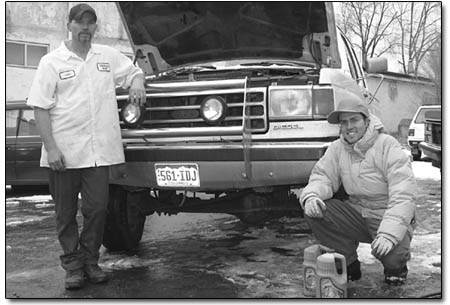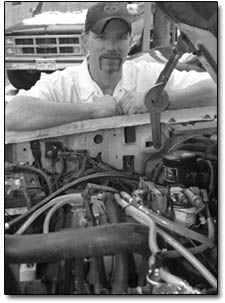|
Durangoan converts diesel engine to run
on used fryer grease
by Amy Maestas
 |
| Odin Thunstrom, left,
of American Made Automotive, and truck owner Craig
Holliday pose Tuesday in front of the Ford diesel
that Holliday converted to run on fryer grease with
the help of Thunstrom. The frenchfry- grease powered
truck gets 15 miles to the gallon./Photo by Todd Newcomer.
|
On a freezing morning, Craig Holliday is hovering under
the hood of his white Ford pickup, watching the same vegetable
oil that his father used to fry a Thanksgiving turkey
course through the tubes leading to his diesel engine.
The faint odor of diesel fuel lingers in the air until
the truck warms up – and then it smells like McDonalds.
Or, for that matter, any of your favorite greasy, fast-food
restaurants.
After a few minutes, Holliday, his mechanic, Odin Thunstrom,
and I climb into the double-cab and drive off on the snow-packed
roads in north Durango. When we narrowly avert a crash
with a snowplow, Holliday turns off the main drag and
begins cruising the alleys a block away. He’s looking
for the coveted black drum barrels behind restaurants.
Inside the barrels is, literally, how Holliday gets around
town.
The truck is full with the strained oil from his father’s
turkey, so Holliday doesn’t stop and take out the
12-volt pump he uses to extract the discarded fat. But
we still bumble down the alleys while the truck bounces
and rocks as though it’s burping – because
it sort of is. Holliday and Thunstrom tell me there is
air in the fuel lines, creating anything but a smooth
ride right now. But once the air works its way out, the
truck runs smoothly, with as much power and panache as
a diesel can have, even though it was converted recently
to a more environmental and economical means of transportation.
Just two weeks ago, Thunstrom finished installing a conversion
kit in the 1991 F-350 that Holliday bought specifically
for this project. The kit was $700, which Holliday bought
off the Internet. The labor was an extra $800. Thunstrom
estimates that if Holliday drives about 20,000 miles a
year, getting 15 miles per gallon, he’s likely to
save about $2,300 a year in gas.
“That means I get my money back in what I paid
for the kit,” says Holliday, a former high-school-teacher-turned-contractor.
More importantly, though, Holliday says he achieves the
goal of being less dependent on foreign oil sources and,
hopefully, arousing local interest about alternative fuel
solutions.
The politics of vegetable oil
Using vegetable oil as an alternative fuel source is
hardly a new idea. But it is a newly popular idea. In
1900, German mechanical engineer Rudolf Diesel invented
the engine that bears his name. He built it to run on
peanut oil, all the while envisioning a world of farmers
growing their own fuel. Peanut oil as gas never took off
the way Diesel hoped it would. But in subsequent years
after his suspicious death, Diesel’s alternative
fuel proposal was much more accepted and implemented in
Europe than in the United States.
Over the years, Europeans realized the benefits of vegetable
oil: it is biodegradable, nontoxic and derived from a
renewable resource. It also reportedly improves gas mileage
by more than 3 percent and reduces smog-forming nitrogen
oxide emissions by 75 percent. Today, various energy organizations
report that there are about 2,000 biodiesel pumping stations
throughout Europe. Biodiesel is a mixture of vegetable
oil, alcohol and catalyst. Just like other forms of petroleum,
it is sold by the gallon from pumps and can be poured
straight into the fuel tank of any diesel vehicle.
While Holliday is attracted to the efficiency of getting
his oil free and saving what could be thousands of dollars
on gas, he’s more engrossed in the idea of getting
Americans to stop relying on vanishing fossil fuel resources
from foreign countries.
Earlier this year as the United States invaded Iraq,
Holliday said he paid especially close attention to the
country’s intentions – however masked they
might have been. He is more inclined to believe that the
war is rooted more in protecting oil sources than banishing
terrorism or securing freedom. Holliday says his older
brother serves in the U.S. Army and is on the waiting
list to be sent to Iraq.
“He’ll be going over there to fight for our
oil,” Holliday says. “All these guys are giving
their lives for oil. We are blowing up Iraqis and Americans
just to make sure we have enough oil for gas. For me,
it’s just wrong.”
Holliday felt compelled to make a political statement.
He began researching the fuel alternative in the spring,
seeking out publications and demonstrations, like the
one he saw at the Earth Day celebration at the Smiley
Building. At the event, Holliday met
 |
| Thunstrom stands behind
the vegetable oil converter he installed in Holliday’s
truck. The kit cost $700 on the Internet./Photo by
Todd Newcomer. |
Charris Ford, a well-known Telluride resident who has
vociferously espoused the benefits and necessity of biodiesel
fuel. Calling himself the “Granola Ayatollah of
Canola,” in the past couple of years Ford has been
featured in numerous publications, shedding light on the
idea. Ford’s enthusiasm inspired Holliday, he says.
But still, the gnawing feeling of fighting a war for oil
– which Holliday believes the invasion of Iraq is
about – propelled him to “walk the talk.”
“My inspiration is more Ghandi than Charris,”
Holliday says.
The finer points of biodiesel
Though he doesn’t expect to instigate a one-man
insurrection against petroleum fuel, Holliday says his
project has piqued the interest of friends and family.
“Everyone loves it; they think it’s funny,”
he explains.
His father, he says, got a big kick out of sending Holliday
five gallons of turkey-soiled vegetable oil from Ohio
to Durango.
“He laughed.”
More laughable, Holliday says, is4
his frequent trips to the grocery store to buy panty
hose. He uses them to strain the food particles from the
used cooking oil he gets from local restaurants.
“I guess it’s kind of funny to see me standing
in line at Albertsons holding a bunch of panty hose,”
he laughs.
Does he prefer a color?
“Yeah, I like black,” he deadpans.
Those who don’t laugh, though, are skeptical, convinced
that using oil as gas really won’t work. Or that
if it does, once-powerful truck engines will only sputter
around town at the sluggish pace of someone who ate too
many of the donuts fried in that very grease.
Because there aren’t any biodiesel pumps in Durango,
Holliday still must rely on petroleum. His truck has two
gas tanks: One filled with petroleum; the other with recycled
vegetable oil. To heat the oil, Holliday first starts
the truck with diesel fuel and runs on that for about
five minutes. Meanwhile, the heater in the vegetable oil
tank warms it, making it viscous enough to work through
the engine. When it’s warm, he switches to that
tank, which he drives on primarily. Once he stops driving,
Holliday switches back to the diesel fuel, using it to
clean the gas lines so the oil doesn’t solidify.
In spite of the routine, Holliday isn’t concerned
that he has set himself up for a series of irremediable
mechanical problems.
Thunstrom is right by his side doing the fine-tuning.
For him, Holliday’s ambition also may offer him
a business windfall. Now that he’s converted an
engine, Thunstrom is confident he can assemble his own
kit from parts available in town, and then cut the labor
time from two days to eight hours.
As American as you can get
Holliday says he has contacted local oil companies about
procuring and selling biodiesel at the gas stations. He
said he hasn’t heard any promises, but he’s
been greeted with open-minded people who said they would
consider it. Meanwhile, Holliday says his next challenge
is educating locals. He wants to start giving presentations
at schools and community events. He acknowledges that
changing peoples’ mind, especially in our petro-centric
society, will be the chief struggle.
Because of the strong agricultural industry in this area,
there are several people who drive diesel trucks, Holliday
says politics often preclude any promise of changing fuel-buying
habits. He adds that it’s especially hard because
of the current administration.
“We have an oil tycoon for a president, who has
made his money on Texas oil,” Holliday laments.
Instead of the country’s leaders spending “$100
million” on the current situation in Iraq, Holliday
said he promotes a plan that would spend that money on
home soil to support the automotive industry to convert
cars to run on biodiesel.
“That could completely change our country from
being dependent on foreign oil to depending on ourselves
for our gas.”
The Colorado-based National Renewal Energy Laboratory’s
diesel projects claims that biodiesel could contribute
5 percent of this country’s diesel needs. That would
subtract 146 million barrels of imported crude oil each
year, it adds. Ultimately, this would diversify the energy
supply in this country, as well as reduce trade deficit
and improve the U.S. economy.
“Running a car on vegetable oil is as American
and as redneck as you can get,” says Holliday. “To
get farmers to grow our fuel, though, would be a revolution.”
Ultimately, Holliday concedes that it all comes down
to money. Like him, he wishes the government would sanction
and invest in alternative fuel. It reminds, him, he says,
of something a high school teacher once told him: “Every
environmental problem is just an economic problem in disguise.”
Holliday’s truck isn’t disguised though.
You can pick him out by the crunched back bumper and the
french fry smell wafting through the air.
|

